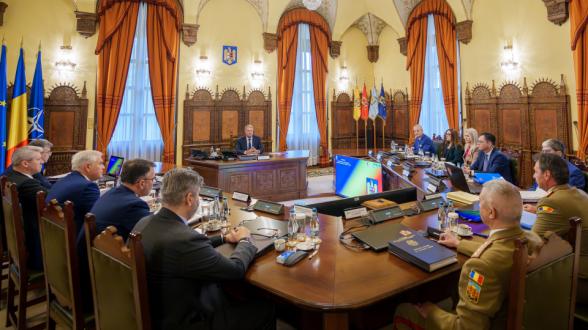CSAT: Romania, directly interested in domestic defence production, additional measures to combat security threats

Romania is directly interested in having industrial facilities on its soil that can secure the production of modern defence technology is one of the conclusions of a meeting on Thursday of the Supreme Council for National Defence (CSAT) that also tackled taking additional measures to deter and combat security threats.
Also featuring on the agenda of the CSAT meeting was an analysis of recent developments in Russia's aggression against Ukraine.
"Their impact on regional security in the Black Sea was analysed, with significant implications at European and Euro-Atlantic level, and additional measures to deter and combat security threats were discussed, to be implemented at national level, as well as with NATO support inside NATO," the Presidential Administration said.
CSAT also discussed the Romanian armed forces acquisition plan in 2025 - 2034.
They concluded that the major change in the regional security situation generated by the aggressive posture of the Russian Federation has led to the rethinking, reprioritisation and reconfiguration of the acquisition plans concerning the defence capabilities necessary to counter the new threats, including by increasing the acquisition of combat ammunition.
"In order to protect the essential security interests and ensure the security of supply, Romania is directly interested in having industrial facilities on its soil that can ensure both the production of modern military equipment for equipping the forces in peacetime and keeping the purchased equipment in operational condition, as well as the manufacture and development of new equipment that contributes to the multiplication of capabilities in crisis or war situations".
An increase in defence spending is said to also generate a direct effect on the Romanian industry, which has the opportunity to initiate a process of transformation, retooling and adaptation by attracting new highly performing technologies and know-how through collaboration with internationally renowned companies.
At the same time, the CSAT looked at the options for strengthening Romania's strategic partnership with Moldova, highlighting the risks to efficiently and consistently manage Moldova's European integration process.
During the discussions, the major opportunities arising from the process of Moldova's accession to the European Union were highlighted, as well as the challenges it faces amid hybrid actions of the Russian Federation and the war of aggression waged against Ukraine.
"These threats and risks generate, in almost all cases, implications for Romania as well. Therefore, the main foreign policy objective of our country in relation to the Republic of Moldova is to support and ensure the irreversibility of its European path by supporting the implementation of reforms and necessary public policies, based on a strengthened bilateral strategic partnership."
CSAT also reviewed and approved the National Plan for the Implementation of the European Union's Civilian Compact in the field of Common Security and Defence Policy (CSDP), following the adoption of a new Civilian CSDP Compact by the European Union.
The Civilian CSDP Compact is designed to make civilian missions more capable, more effective, flexible and responsive and more joined up with other EU instruments in light of the changed security environment. The aim is to strengthen the EU's capacity to deploy civilian crisis management missions.
The document will facilitate Romania's more effective involvement in civilian CSDP missions and capitalise on the experience gained by the country's specialists, given that the participation of Romanian representatives in CSDP missions is part of the national contribution to increasing the EU's role as a global actor.
(Photo:https://www.presidency.ro/)
